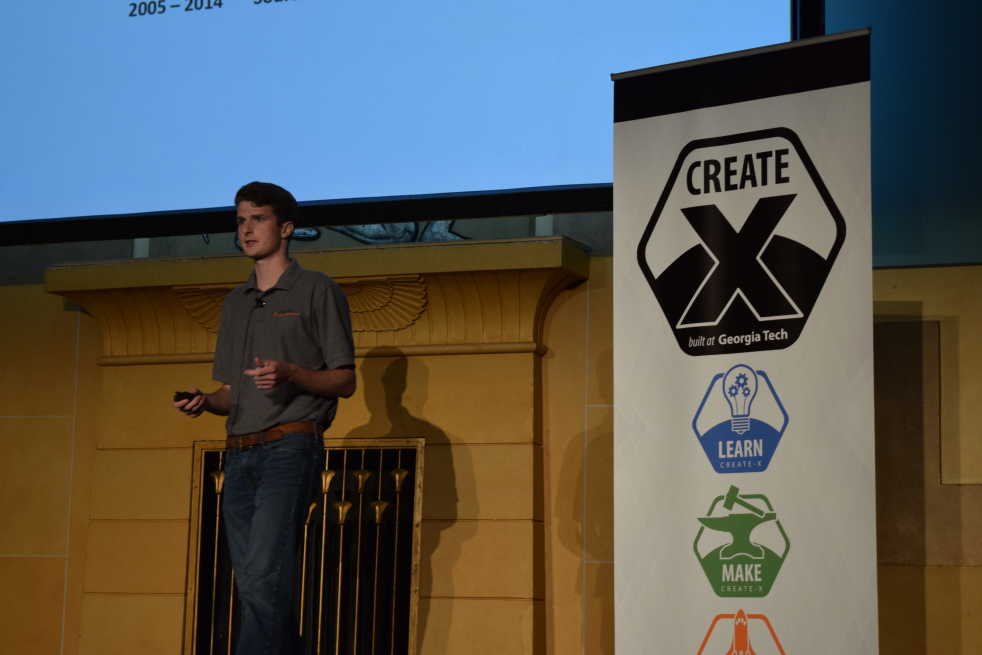This past Tuesday evening, the Fox Theater was bustling with activity in anticipation of the 21 startup teams who, in a few minutes, would be presenting their four minute pitches on the products and services they had been working on for the past four months. The mission of Tech’s Startup Summer program is to provide students with the opportunity to launch startup companies from their own ideas, prototypes and inventions.
Now in its third year, Startup Summer has helped launch 42 different startups. This year, Startup Summer received 120 applications, of which only 21 were accepted. These 21 teams then went on to participate in 12 weeks of developing their product, with up to $20,000 in funding, mentorship, workspace and intellectual property protection.
Demo Day was comprised of two hours of startup pitches followed by demonstrations. During the presentations startup founders discussed the purpose of their products, the target audience and why their products are important.
A few of the startups presented include a medical information database, a database of revolutionary guitar tutorials, a sports focused multi-medial relational database community, a drone designed fly longer than existing drones using biomimicry to emulate the natural flapping pattern of birds, a location tracking dog collar and an all-natural energy drink.
“The event itself is the culmination of the entire summer startup program, so it’s the 12 week program and it’s really intense,” said Raghupathy Sivakumar, executive director of Create-X, the organization that runs student entrepreneurship initiatives like Startup Summer.
“We have a tagline — ‘give us a summer, we’ll give you a startup’ — but in reality, these startups give more than the summer, because they’re lodging the grain that involves a lot of hard work. Today’s event is the snapshot that you get into that journey,” Sivakumar said.
Startups like FitGenie, a fitness tracker powered by artificial intelligence, are working on pitching their product into the market.
“We really want to build a great product for our initial market and provide significantly more value in a free app than other fitness trackers,” said Obi Anachebe, CEO of FitGenie.
“From there we’ll look to implement premium features that make use of the artificial intelligence algorithms we’ve built and allow us to go head to head with the big fitness trackers on the market. Long term, we’d like
to be an end-to-end nutrition
solution where a button click would get you everything you need determined by our algorithms and delivered to your door,” Anachebe said.
The process of applying for startup summer and idea development is thorough and intense. Students apply as a team with a clear startup hypothesis. The initial proposal includes students presenting their prototype, why they think their idea would be successful, and how they came together as a group.
“The single most important ingredient that we’ve identified of the three years is how strongly committed the team is,” Sivakumar says. “You would think that it is the product, but that actually doesn’t matter as much as how committed and close knit
the team is.”
The idea is then presented to a panel who initially provide the team with guidance, before
moving onto the selection of the 21 teams who participate in Startup Summer.
However, after getting into the program, the rest of the journey is by no means easy.
“The greatest challenge that we are currently facing is connecting with the right people in the beverage industry that understand what we are trying to do,” said Charles Lankau, founder of Synapse, an all-natural synaptotropic energy microbeverage. “We are on the cutting edge of a new wave of functional beverages and we are facing the burdens of being first. It is our responsibility to educate both consumers and potential investors about a new market that is set to take off.”
Applications for Startup Summer open during the spring semester and are quite competitive.
“Start working on the idea as soon as possible,” said Sheena Patel, fourth-year EE and co-founder of Catalize, a mobile
application that makes personal and professional introductions and networking easier.
“Assemble a team, assign roles and then begin making it. When you have the most basic version of your idea built, put it in front of people and get their feedback. If you are doing all of this even before Startup Summer, you’ll really stand out from the other
teams applying and will have a great shot at getting into the program,” Patel said.
In this age of entrepreneurship and with the amount of talent and knowledge in college, having an active startup culture is becoming increasingly relevant and important. Referencing Johns Hopkins, Sivakumar said, “University was where you went to gain knowledge and then Johns Hopkins came along and said universities can be research institutions as well, where you can share knowledge, but also discover knowledge as well. I think universities are going through a phase of evolution where in addition to being learning centers and discovery centers, they’re also becoming impact centers. How can I put what I learn to use? How do I impact society?”
In an environment of hard-working and ambitious people, Tech is the perfect place for the critical thinkers who drive an entrepreneurial spirit.
To learn more about Startup Summer or to get involved, check out startupsummer.gatech.edu.
